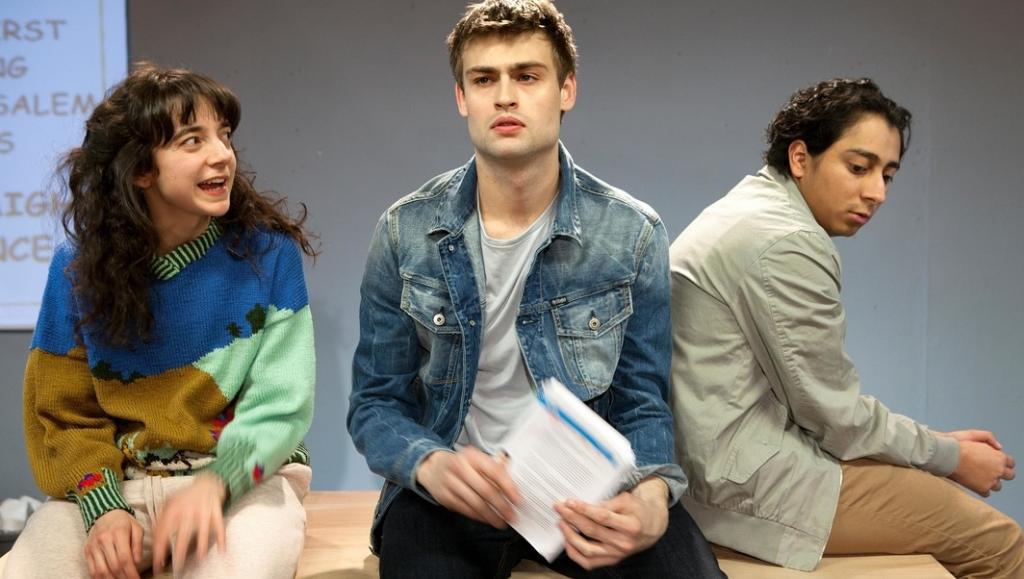To See or Not to See: Speech & Debate

Stephen Karam‘s Speech & Debate is getting a winning U.K. premiere from the Defibrillator company at London’s Trafalgar Studios. Karam – whose play The Humans won a slew of Tony Awards in 2016 – creates plays that are searingly funny and timely. Speech & Debate, which first premiered Off-Broadway in 2007, is no exception: it is a humorous and painful probe into modern American youth, warts and all. Set in Salem, Oregon, the play follows three self-interested teenagers who join their school’s speech and debate team to expose a drama teacher’s sexual crimes.
Indeed, the play itself follows a rich tradition of American art that tackles the angst of teenage life. From The Catcher in the Rye, The Outsiders, Splendour in the Grass, and Rebel without a Cause to more recent entries like the Twilight saga, The Breakfast Club, The Perks of Being a Wallflower, and the musical Spring Awakening, stories about alienated teenagers coming to terms with themselves, their sexuality, and the moral hypocrisy of adults are hardly new. But what makes Karam’s play unique is its sense of humor and exploration of technology. Social media connects the lives of the three main characters, and we often see them turning to the internet to abate their loneliness through online discussion boards or by broadcasting their thoughts on blogs.
The fact that Speech & Debate explores these issues in a town called “Salem, Oregon” is purposeful, too. The play repeatedly references Arthur Miller‘s Salem, Massachusetts-set classic The Crucible, which fictionalizes the infamous 1692 Salem Witch Trials. While Speech & Debate is not about Puritans gone wild, it does, like The Crucible, focus on a group of teenagers who feel empowered through the theater of accusation.
So, how does a play transfixed with American teenagers, the social politics of high school, and a Puritanical moral legacy fare in London? I’m pleased to report that in the hands of director Tom Attenborough and a superb cast, this production is every bit as funny, poignant, and troubling as it should be. Part of what makes this production so appealing is its staging. For one, technology is used to great effect. Texts and chats are broadcast on the walls and music blasts throughout the theater, as if you’ve stumbled into the characters’ bed rooms. Trafalgar Studios is a small venue, holding just shy of 100 audience members. The couch-like seats and the proximity of the actors to the audience make it a cozy, intimate night of theater.
But this play is only as strong as the three leads, and the main characters are played with guts by the excellent cast. Tony Revolori – whom you might recognize as the hard-working Zero from Wes Anderson‘s The Grand Budapest Hotel – is the lone American in the cast, and he infuses Solomon with fast-talking verve, wide-eyed angst, and shaken innocence. Solomon is a amateur reporter, and his dark, troubled secrets stand in contrast to his directness and dogged hunt for the truth. When his closely-guarded secrets ultimately spill out, Revolori’s breakdown is stunningly raw – as the tears roll down his face, you almost want to look away, since you feel as though you are intruding on his private suffering.
Douglas Booth plays Howie, a new kid on the block who is attempting to build a gay-straight alliance at the high school. At the start of the play, it’s his actions that set the wheels in motion: 18-year-old Howie solicits sex online from a thirtysomething male who turns out to be the school’s drama teacher. It is refreshing to see Booth – who, as in The Riot Club, Great Expectations, or And Then There Were None, tends to get cast as hyper-privileged characters – in a role that is the antithesis of privilege. The triumph of Booth’s performance is in the details, and he brings Howie to life with sensitivity and intelligence through little glances, restless fidgets, and subtle expressions.
Last and most certainly not least is Patsy Ferran‘s sharp and outrageous Diwata, an ambitious theater nerd who has lost out on the lead role in the school’s production of Once Upon a Mattress. Ferran’s Diwata is as delightful as she is ridiculous. As she quips, sings, and dances her way through the play, Ferran quite simply steals every scene that she is in. She easily realizes Diwata with quirky charm and confident resolve. Still, even with her impeccable comedic timing, Ferran also delivers on some of the more dramatic moments in Diwata’s story, too, and offers heartbreaking glimpses of real pain behind the bravado.
Indeed, the play isn’t all laughs. Each of the characters is fed up with the small-mindedness of Salem and the limitations placed on them by the school: Diwata believes her talent isn’t appreciated; Howie, a former resident of cosmopolitan Portland, can’t wait to get out of a small town where he can’t even enlist an advisor for a gay-straight alliance; and Solomon encounters road blocks on various topics he would like to investigate for the school newspaper. Moreover, just like high school itself, moments of hilarity in the play mask deeper suffering. Each of the characters carry their own secrets, and Revolori, Booth, and Ferran reveal them with understated anguish.
Brimming with the ambition, awkwardness, and growing pains of youth, this new London production of Speech & Debate will delight and devastate you in equal measure.
Speech & Debate runs at Trafalgar Studios through April 1, 2017.
Photo Credit: Simon Annand/The Times


Discussion about this post